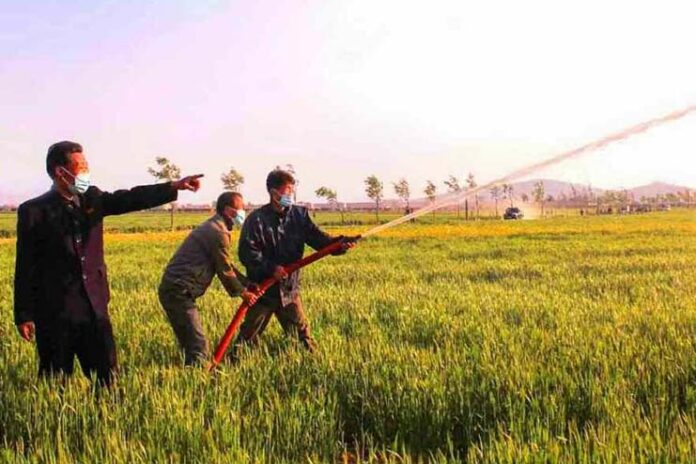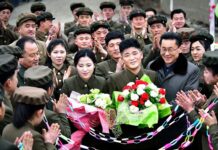
Agricultural bureaucrats in several regions of North Korea were recently disciplined during general reviews held ahead of a Central Committee plenary meeting scheduled for late December.
The officials appear to have been punished for failing to achieve yearly production goals.
“During recent end-of-year general reviews at the provincial party committee meeting room, a number of cadres were sacked for failing to achieve [quotas] for military rice production,” a source in South Pyongan Province told Daily NK on Wednesday.
“Three county management committee heads and 31 collective farm management committee heads were punished,” he added.
North Korea scheduled a plenary meeting of the Central Committee for the last week of December. Accordingly, local authorities across North Korea conducted sector-by-sector general review meetings to prepare reports to submit during the plenary meeting.
In sum, officials are being rewarded for their merits or punished for their sins based on the results of the general reviews.
BLEAK AGRICULTURAL FORECAST FOR 2023
North Korean leader Kim Jong Un expounded upon his “socialist rural construction” vision during a Central Party plenary committee late last year, emphasizing increased agricultural production as a top priority this year.
However, North Korea faces a bleak forecast for this year’s agricultural production.
According to a report on North Korean food production for 2022 released by South Korea’s Rural Development Administration on Dec. 14, North Korea produced 4.51 million tons of food this year, down 3.8% from last year’s production of 4.69 million tons.
In some regions, shortages of military rice stores have even forced some units of the military to shorten their winter training, one of the biggest drills of the year.
Accordingly, officials in the agricultural sector are likely to face intensive reviews, with those in charge facing the potential of being punished for failing to meet state-set quotas.
The recent punishment of party cadres in South Pyongan Province may have transpired amid these reviews.
Some North Koreans are reportedly complaining about the government’s punishment of the cadres.
Daily NK’s source said farming failed this year due to “natural disasters and shortages of fertilizer and supplies. [But the Workers’ Party] is saying [the failure to meet state-set production plans] was because of insufficient loyalty [among the cadres].”
The source complained that cadres easily find themselves on the chopping block in the Kim Jong Un era.
“It’s frustrating that innocent people are being punished while the real problems remain unresolved,” he said.
ALL HAIL “SCIENTIFIC FARMING”
North Korean authorities have praised collective farms that have properly carried out the party’s “scientific farming” for “maintaining good results amid adverse conditions.”
However, authorities have slammed farms that have failed to produce results for their “inability to properly carry out scientific farming.”
Rodong Sinmun reported on Dec. 22 that comprehensive analysis and review show that “everything boils down to how thoroughly and how perfectly” farms carried out the party’s scientific farming policy.
The outlet said this year’s harvest was a test to determine whether or not farms carried out the party’s scientific farming policy “with conviction.”
The newspaper went on to criticize farms that failed to produce sufficient crop yields for improperly carrying out “scientific farming” and for blaming bad weather and shortages of supplies.
The authorities appear to be shifting blame onto collective farms, claiming that if the lower ranks in the country’s agricultural production chain had responsibly carried out “scientific farming” as the Workers’ Party had instructed, they would have gotten results.
Meanwhile, farms in some regions of South Pyongan Province underwent inspections in October for failing to achieve even half of the year’s agricultural production goals.
At the time, some people complained how the government was trying to shift the blame for falling agricultural production solely onto collective farms while failing to provide those same farms with proper agricultural supplies.
Please direct any comments or questions about this article to dailynkenglish@uni-media.net.


















